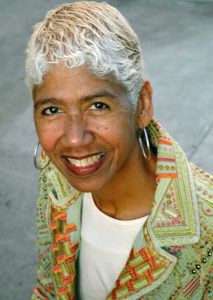This month, in conjunction with the “All Power to the People: Black Panthers at 50” exhibition at the Oakland Museum of California, we’re highlighting Fiona Thomson’s oral history of Ericka Huggins. In this interview, Huggins talks about her personal and spiritual history, her leadership role in the Black Panther Party, and her lifelong commitment to social justice.
In 1968, at age 18, Huggins became a leader in the Los Angeles chapter of the Black Panther Party with her husband John Huggins. Three weeks after the birth of their daughter, John Huggins was killed and Erika Huggins was widowed. After returning to New Haven, Connecticut, to be with John’s family, Ericka Huggins was invited by community members and students to open a party chapter there. She accepted the invitation.
In May 1969, Huggins and fellow Party leader Bobby Seale were targeted and arrested on conspiracy charges, sparking “Free Bobby, Free Ericka” rallies across the country. The resulting trial, one of the longest and most celebrated of the era, spawned several books.
While awaiting trial for two years before charges were dropped, including time in solitary confinement, Huggins taught herself to meditate as a means to survive incarceration.
From 1973-1981, Huggins was Director of the Oakland Community School, a groundbreaking community-run child development center and elementary school founded by the Black Panther Party. In 1976, Ericka Huggins became both the first woman and the first Black person to be appointed to the Alameda County Board of Education.

A lifelong writer and poet, upon release from prison in 1971, Ericka became writer and editor for the Black Panther Intercommunal News Service. She is the co-author, with Huey P. Newton, of Insights and Poems, published in 1974. Huggins is now professor of Sociology and African-American Studies in the Peralta Community College District.
In her four interviews with Thomson, Huggins talks candidly about her experiences as a child in segregated Washington, DC, and as a mother, activist, spiritual practitioner and teacher, and friend and lover. The oral history adds to the Bancroft Library’s archive of materials related to the Black Panthers, including the papers of Eldridge Cleaver and the photographs of Stephen Shames.
If you are in the Bay Area, be sure to visit the multimedia exhibit at the Oakland Museum (open until February 12, 2017), to learn more about the Black Panthers and the contributions of Ericka Huggins and many others to the ongoing struggle for social justice.
Linda Norton, Senior Editor